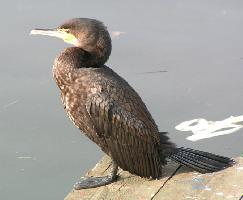
Animal description
The European shag, scientifically known as Gulosus aristotelis, is a captivating bird species that belongs to the cormorant family, Phalacrocoracidae. With its sleek profile and distinguished features, this bird is a fascinating subject for birdwatchers and nature enthusiasts alike.The European shag is characterized by its dark, glossy plumage that appears almost black, with a slight green or purple sheen that becomes particularly noticeable in sunlight. Adult shags typically measure about 68 to 78 centimeters in length, with a wingspan ranging from 95 to 110 centimeters. This makes them slightly smaller and more slender than their close relatives, the great cormorants.
One of the most striking features of the European shag is its long, slender neck, which it often holds in an "S" shape, especially while swimming. Its head is adorned with a distinctive crest during the breeding season, adding to its elegant appearance. The bird's beak is long, thin, and hooked at the tip, perfectly designed for catching fish, which comprises the bulk of its diet. Its eyes are a vivid green, which contrasts strikingly against its dark plumage.
The European shag is predominantly a coastal bird, found along the rocky shores and islands of the Atlantic Ocean, from the Iberian Peninsula and North Africa in the south, to parts of Norway and Iceland in the north. It prefers nesting on cliff ledges or rocky outcrops, where it builds its nests out of seaweed, twigs, and feathers. The bird is less frequently found inland, though it may venture into estuaries and along large rivers in search of food.
Breeding season for the European shag is a time of vibrant social activity. The birds become more territorial, with males performing elaborate displays to attract mates. They lay 3 to 5 pale blue eggs, which both parents take turns incubating. The chicks are altricial, meaning they are born blind and featherless, entirely dependent on their parents for food and protection.
The European shag is an excellent diver, using its powerful webbed feet to propel itself underwater in pursuit of fish. It can dive to impressive depths and remain submerged for up to a minute. After a successful hunt, it is common to see a shag perched on a rock with its wings outstretched, drying its feathers in the sun since, unlike many waterbirds, its feathers are not completely waterproof.
Conservation status of the European shag varies across its range, but overall, the species is considered to be of Least Concern by the International Union for Conservation of Nature (IUCN). However, like many seabirds, it faces threats from pollution, overfishing, and habitat loss. Conservation efforts are focused on protecting its breeding and feeding grounds to ensure the survival of this unique species.
In summary, the European shag is a remarkable bird with a distinctive appearance and fascinating behaviors. Its presence along Europe's coasts adds to the rich tapestry of marine biodiversity and underscores the importance of preserving natural habitats for future generations to enjoy.
Similar Animals
New photos of animals
Top 10 animals
- Dolphin gull (Leucophaeus scoresbii)
- Diana monkey (Cercopithecus diana)
- Moustached guenon (Cercopithecus cephus)
- Galápagos tortoise (Geochelone nigra complex)
- Japanese macaque (Macaca fuscata)
- Stone loach (Barbatula barbatula)
- Greek tortoise (Testudo graeca)
- Russian tortoise (Testudo horsfieldii)
- Common flying dragon (Draco volans)
- Galápagos penguin (Spheniscus mendiculus)


